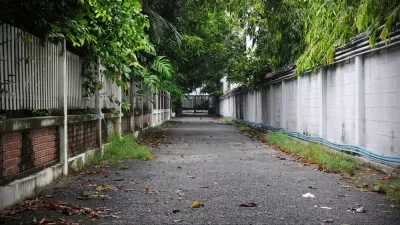A review of the recent "Future of Suburbia" event held at the Center for Advanced Urbanism at the Massachusetts Institute of Technology.

"Whether we are aware of it or not, even the most self-consciously curated 'urban' lives are staged and supplied by the jumbled realm of suburbia," begins an in-depth article by Amada Kolson Hurley examining the recent "Future of Suburbia" event held at the Center for Advanced Urbanism (CAU) at the Massachusetts Institute of Technology (MIT).
Unlike a previous article by Randy Rieland, Kolson Hurley's article offers a more critical reading of the event's proceedings, including the implied criticism of the event's single-minded support of a suburban agenda.
Also present, however, is a sympathetic ear toward the need to have a critical discussion about suburbia, rather than just falling back to the often-elitist biases assumed by self-proclaimed urbanists. "All in all, CAU is making a concerted bid to reposition suburbia as a serious subject of design inquiry," explains Kolson Hurley. "It couldn’t have come soon enough."
Among a detailed account of the event's proceedings, Kolson Hurley also makes a nuanced point about how the event's politics differs from the approache taken by "Reformers," who would retrofit suburbia. Instead, the CAU has created a space for "Validators":
They believe that suburbia is fundamentally OK. They maintain that when people have options, they will usually choose to live in a single-family home in the suburbs, and for intellectuals to resist this is classist and perverse. Validators point out (correctly) that the much-hyped urban revival we keep reading about is mostly limited to affluent white Gen Xers and Millennials. At the conference, economist Jed Kolko analyzed recent census data to show that on the whole, America continues to suburbanize.
To conclude the article, however, Kolson Hurley critiques that framework by noting the neglected subject of environmental impact of suburban land use. That criticism transitions into an appeal for further inquiry and continued effort at finding a common ground for "Reformers," "Validators," and urbanists alike.
FULL STORY: The “Future of Suburbia,” according to MIT

Alabama: Trump Terminates Settlements for Black Communities Harmed By Raw Sewage
Trump deemed the landmark civil rights agreement “illegal DEI and environmental justice policy.”

Study: Maui’s Plan to Convert Vacation Rentals to Long-Term Housing Could Cause Nearly $1 Billion Economic Loss
The plan would reduce visitor accommodation by 25% resulting in 1,900 jobs lost.

Planetizen Federal Action Tracker
A weekly monitor of how Trump’s orders and actions are impacting planners and planning in America.

Baltimore Ordered to Improve Sidewalk Accessibility
The city is one of many to face lawsuits for failing to comply with the Americans with Disabilities Act.

This Toronto Suburb Has More Bus Riders Than Columbus, Ohio
Brampton, Ontario used gradual improvements in service to prove that if you build it, they will ride.

Paris Bike Boom Leads to Steep Drop in Air Pollution
The French city’s air quality has improved dramatically in the past 20 years, coinciding with a growth in cycling.
Urban Design for Planners 1: Software Tools
This six-course series explores essential urban design concepts using open source software and equips planners with the tools they need to participate fully in the urban design process.
Planning for Universal Design
Learn the tools for implementing Universal Design in planning regulations.
Smith Gee Studio
Alamo Area Metropolitan Planning Organization
City of Santa Clarita
Institute for Housing and Urban Development Studies (IHS)
City of Grandview
Harvard GSD Executive Education
Toledo-Lucas County Plan Commissions
Salt Lake City
NYU Wagner Graduate School of Public Service




























